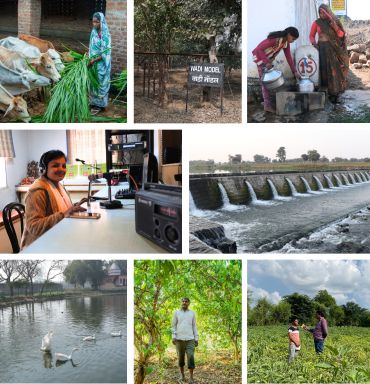
The resource-starved region of Bundelkhand, which includes 7 districts of Madhya Pradesh and 7 districts of Uttar Pradesh, has faced back-to-back drought years which have resulted in high water stress conditions, unsustainable farming practices, consequently resulting in farmer distress, high migration, unemployment, and poverty rate.
For decades, DA has been leading the discourse on climate resilience and ecosystem restoration that particularly focuses on the integration of nature-based solutions to address the interconnected challenges of climate change, ecosystem degradation, biodiversity loss, and livelihood vulnerability.
Due to global warming induced changing weather patterns, the farmers in the region need to be equipped with appropriate knowledge and skills. The three major thrust areas that DA has been working in Bundelkhand are:
Natural Resources Management
Solutions focussing on strong practice-to-policy connect with on-ground demonstration of resilient models and improved practices for land and water management such as pond rejuvenation, construction of water conservation structures, e.g., check dams, LOCO models etc.
Climate Adaptation and Resilience
Solutions focussing on climate change communication either through radio programmes or enabling the community to adapt to climate change by adopting nature-based solutions.
We have our flagship model, a community radio station called Radio Bundelkhand 90.4 FM, established in 2008 which is the first community radio station in Madhya Pradesh and second in India. It has emerged as a people’s radio station that provides them with a platform to air their aspirations, concerns and showcase their talent. It’s participatory and collaborative approach empowers and builds consensus for change. Today, Radio Bundelkhand directly covers 150 villages, reaching out to over 400,000 people in Bundelkhand and to many more through its mobile application.
Sustainable Agriculture
Solutions focussing on linking farmers, especially small holder farmers, to appropriate eco-technologies, providing technical support, and conducting farmers training through the promotion of WADI model, adoption of climate resilient farming practices, and building resilient farming systems. etc.
At TARAgram Yatra 2024, Yatris will be able to:
Come, and witness the real-life climate action and solutions from an on-ground perspective through the lenses of the community that is adapting to these changes simultaneously.